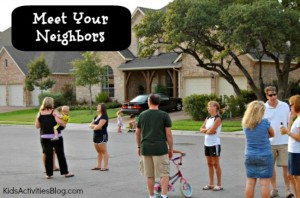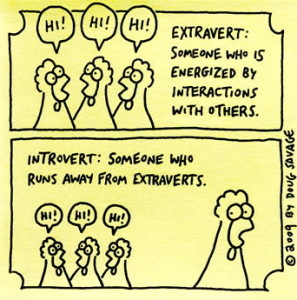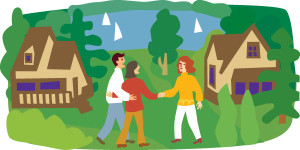 The topic of community comes up quite often in the prepper world – what does forming community really mean? How do you develop it? What is too much? Too little?
The topic of community comes up quite often in the prepper world – what does forming community really mean? How do you develop it? What is too much? Too little?
I recently read a story on NPR, The Key To Disaster Survival? Friends and Neighbors. This got me to thinking more about this topic, and I agree even if it’s somewhat loose, a basic awareness and familiarity with neighbors is a good thing.
 But in our house I’m the introvert. And, to clarify, when I say introvert I mean in the sense that I gain energy from being alone — I recharge in solitude. An extrovert (i.e. Trace), on the other side, would be someone who gains energy from interacting with others. Most days, when I get done with work, all I want is to curl up and not talk to anyone. I want to sit and be quiet and recharge.
But in our house I’m the introvert. And, to clarify, when I say introvert I mean in the sense that I gain energy from being alone — I recharge in solitude. An extrovert (i.e. Trace), on the other side, would be someone who gains energy from interacting with others. Most days, when I get done with work, all I want is to curl up and not talk to anyone. I want to sit and be quiet and recharge.
For me, the idea of forming community makes sense; I completely agree that it is so important to be a part of a group that helps each other. However, in reality the last thing I feel like doing is taking time to chat with the neighbors when we pass them going to check the mail, or when we’re out doing yard work. I just want to be left alone.
In addition to my personal desire for solitude, I’m also struck by the United States’ emphasis on the other side of the coin – independence. Being independent is viewed and portrayed as a sign of strength; asking for help is viewed as a sign of weakness. We are raised to be suspicious of those who can’t do it on their own; to see those who need aid as a nuisance or even a threat. And, as preppers, there could be a real threat if we have supplies, power, a refuge and those around us do not.
 So, how do we reconcile all of this? There is the need (and desire) for a community. There is the need for solitude. There is the pride of independence. There is the threat of strangers. I think the key–and it’s something Trace does well–is to form relationships simple at first, and develop them over time. Start with waving at the neighbor as they unload the groceries. Then maybe say hi and ask who they’re rooting for in the game when you see each other the next time. Get to know their names, a little about their family, where they work. Eventually you might even ask them over for a backyard BBQ.
So, how do we reconcile all of this? There is the need (and desire) for a community. There is the need for solitude. There is the pride of independence. There is the threat of strangers. I think the key–and it’s something Trace does well–is to form relationships simple at first, and develop them over time. Start with waving at the neighbor as they unload the groceries. Then maybe say hi and ask who they’re rooting for in the game when you see each other the next time. Get to know their names, a little about their family, where they work. Eventually you might even ask them over for a backyard BBQ.
Maybe it only gets as far as a simple “hi” when you see them. That’s okay. The two of you have moved from the unknown (strangers) to the known (passing acquaintances). For humans moving out of the realm of strangers is incredibly powerful on a very basic level. I can barely remember our neighbors’ names, yet I know what house I’d go to if I needed help, or to just borrow a cup of sugar. I don’t know them well, but they are not strangers.
Being prepared isn’t just about stuff or even skills, it’s also about stretching ourselves to reach out and meet new people, thereby forming the community that could be the difference between success and failure.
